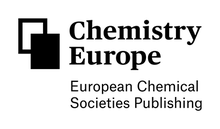Chemistry Europe
Chemistry Europe (formerly ChemPubSoc Europe) is an organization of 16 chemical societies from 15 European countries, representing over 75,000 chemists. It publishes a family of academic chemistry journals, covering a broad range of disciplines.[1][2]
 | |
| Predecessor | ChemPubSoc Europe |
|---|---|
| Formation | 1995 |
| Website | https://chemistry-europe.onlinelibrary.wiley.com/ |
Chemistry Europe was founded on the initiative of the German Chemical Society in 1995. The first journal co-owned by Chemistry Europe was Chemistry—A European Journal (launched in 1995). In 1998, the European Journal of Inorganic Chemistry and European Journal of Organic Chemistry were created with the participation of six European chemical societies.[3] Over the years, more societies merged their journals, bringing the total number of societies involved to 16 from 15 different countries (as of 2020).
The Chemistry Europe Fellows Program was established in 2015 (as the ChemPubSoc Europe Fellows Program) and is the highest award given by Chemistry Europe. The Fellowship is awarded based on the recipients' support as authors, advisors, guest editors, referees as well as services to their national chemical societies. New Fellows are announced every two years in the run-up to the biannual EuChemS Congress.[4]
Participating societies
The 16 participating European chemical societies are:[2]
- Gesellschaft Österreichischer Chemiker (GÖCH), Austria
- Société Royale de Chimie (SRC), Belgium
- Koninklijke Vlaamse Chemische Vereniging (KVCV), Belgium
- Česká společnost chemická (ČSCH), Czech Republic
- Société Chimique de France (SCF), France
- Gesellschaft Deutscher Chemiker (GDCh), Germany
- Association of Greek Chemists (EEX), Greece
- Magyar Kémikusok Egyesülete (MKE), Hungary
- Società Chimica Italiana (SCI), Italy
- Koninklijke Nederlandse Chemische Vereniging (KNCV), The Netherlands
- Polskie Towarzystwo Chemiczne (PTChem), Poland
- Sociedade Portuguesa de Química (SPQ), Portugal
- Slovenská Chemická Spoloćnosť (SCS), Slovakia
- Real Sociedad Española de Química (RSEQ), Spain
- Svenska Kemistsamfundet (SK), Sweden
- Schweizerische Chemische Gesellschaft (SCG), Switzerland
Journals
The journals are published by Wiley-VCH and include the titles: Chemistry—A European Journal, European Journal of Organic Chemistry, European Journal of Inorganic Chemistry, Chemistry—Methods, Batteries & Supercaps, ChemBioChem, ChemCatChem, ChemElectroChem, ChemMedChem, ChemPhotoChem, ChemPhysChem, ChemPlusChem, ChemSusChem, ChemSystemsChem, ChemistrySelect, ChemistryOpen, and ChemistryViews online magazine.
References
- "ChemPubSoc Europe becomes Chemistry Europe". CHEManager International. Retrieved 8 April 2020.
- "Chemistry Europe – The Chemical Publishing Society in Europe". Gesellschaft Deutscher Chemiker. Retrieved 8 April 2020.
- Köster, Vera (2010). "The Future Builds on the Past". ChemViews. doi:10.1002/chemv.201000010.
- Amsterdam, Universiteit van (2020-06-04). "Prof. Bas de Bruin named Chemistry Europe Fellow - HIMS - University of Amsterdam". hims.uva.nl. Retrieved 2020-04-30.